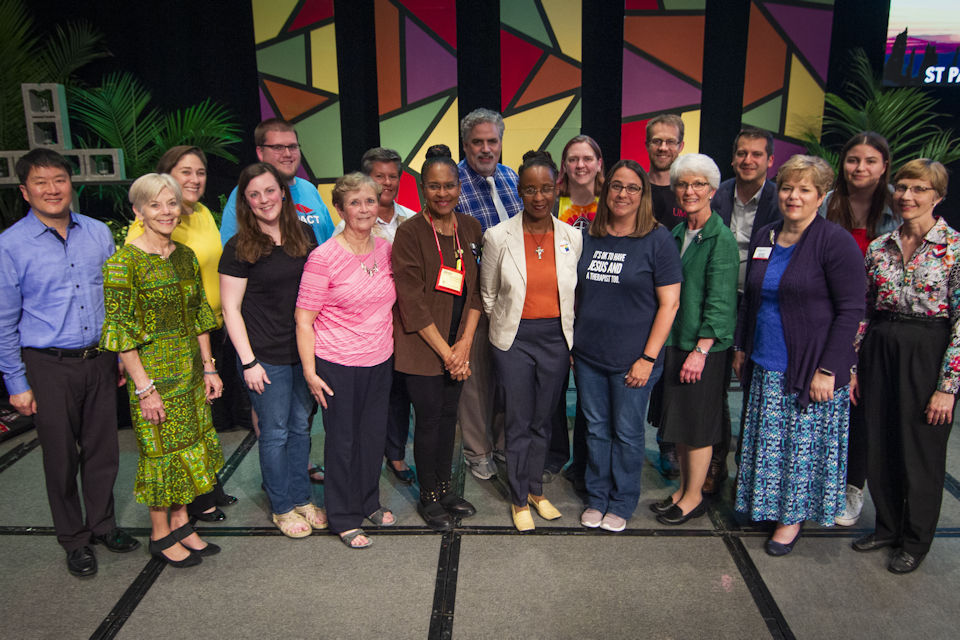Four Michigan Conference leaders — Bishop David Bard, Rev. Benton Heisler, Laura Witkowski, and Rev. Kennetha Bigham-Tsai — offer their initial responses to the separation plan announced on January 3rd.
KAY DEMOSS
Senior Content Editor
Just as United Methodists stepped over the threshold of a new decade, starting a five-month trek toward a momentous General Conference, an announcement came. On January 3, 2020, we learned that “A diverse, 16-member group of United Methodist bishops and other leaders has offered a proposal that would preserve The United Methodist Church while allowing traditionalist-minded congregations to form a new denomination. The separating group would get $25 million in United Methodist funds and would keep its local church properties.” Read the account from United Methodist News here.
UM News reporter Sam Hodges speculated, “Given the broad, influential coalition involved – including bishops from around the global connection and advocacy group leaders often sharply at odds – the potential seems strong that the separation proposal can end or at least greatly reduce the denomination’s decades-long struggle over how accepting to be of homosexuality.”
Reaction to that announcement was swift and continues across the worldwide denomination. See the UM News account released yesterday, four days after the Protocol of Reconciliation and Grace through Separation was first broadcast.
Michigan Conference leadership is now offering comments on the Protocol. Bishop David Bard released a statement the same day the global news broke. “Yesterday, January 2, I participated in a conference phone call with 90 members of the Council of Bishops,” Bard said. “We were briefed on The Protocol of Reconciliation and Grace Through Separation that has been released today.”
The bishop said that he had not entirely digested the entire document and FAQs that accompanied it but noted, “my initial impression is that this is an extraordinarily hopeful development. The protocol offers The United Methodist Church a unique opportunity to move beyond our current impasse over ministry with LGBTQ+ persons and toward a needed restructuring in our governance.” He also affirmed the document’s acknowledgment of the work needed to address “long-standing issues of racial-ethnic inclusion within our denomination.”
For the past year, in sermons, presentations, and numerous blogs, Bishop Bard has talked about the need for the creation of new and different space within The United Methodist Church. “This protocol agreement offers this,” he stated.
Bishop Bard directly addressed a key facet of the proposed separation plan saying, “As an early advocate for a moratorium on complaints regarding LGBTQ clergy and same-sex weddings as part of a larger agreement on the future of the UMC, I intend to follow the direction of the protocol in holding in abeyance ‘all administrative or judicial processes addressing restrictions in the Book of Discipline related to self-avowed practicing homosexuals or same-sex weddings beginning January 1, 2020, through the adjournment of the first conference of the post-separation United Methodist Church.’”
On January 8th, the bishop added to his initial statement, in response to questions received from clergy and laity across Michigan about what a post-separation Michigan Conference would look like if something like the Protocol proposal is approved at General Conference. “In particular, I am being asked whether there would be a place for persons whose own theology might be more traditional but who are not necessarily wanting to become part of a new Methodist denomination formed in light of the protocol.”
His response reflected the broad vision of both John Wesley and The Michigan Conference. “I envision a conference that would welcome but not require clergy to officiate at same-gender weddings nor churches to host them. It would welcome persons, regardless of sexual orientation, who meet the requirements of The Book of Discipline including celibacy in singleness and fidelity in marriage, to seek licensing, ordination and appointment within the conference. Appointments would continue to be made with consideration given to the full range of contextual realities.”
Consistent with his call for the creation of “new and different space,” Bishop Bard continued, “Persons of differing theological perspectives would be welcomed and valued as part of the rich fabric of the Michigan Conference. Our unity would continue to be found in a shared faith in Jesus Christ and a shared passion for the ministry of the church. We would remain committed to congregational vibrancy, bold and effective leadership, and Christ-centered mission and ministry.”
Bard concluded with words of gratitude but acknowledged, “I receive this document with sadness. That the space we needed to create within The United Methodist Church is separation saddens me. Necessary as this may be, there are tragic dimensions to this action.”
Click here to read Bishop David Bard’s latest blog, “New Year, New Tasks,” that also addresses the Protocol and the ministry work, soul work, and grief work that lie ahead.
Michigan Conference Director of Connectional Ministry, the Rev. Benton Heisler, also reflected on the Protocol. “Like many, I have been struggling with understanding with the future of The United Methodist Church will be in light of our fractures and failings.” He sees the action of the 16-member group as an answer to ten months of prayer. “Since the 2019 General Conference, I have consistently believed that key representatives of the various organized ‘voices’ would need to broker some kind of an agreed-upon ‘truce toward a lasting peace,’” Heisler observed. He celebrates both the negotiations and the “confidentiality that was maintained through the process.”
The Director called the proposal “a reasonable compromise that keeps the many positive elements of The United Methodist Church intact, doesn’t destroy boards and agencies, gives progressives the freedom desired and those with a more traditional belief framework an honorable path to follow for their expressions of hope and healing of the world.”
The Protocol of Reconciliation and Grace Through Separation is a proposal that will now be reformulated into legislation for consideration by delegates gathered in Minneapolis in May 2020. In view of that reality, Heisler concluded with a word of cautious hope. “I pray the delegates will see the wisdom in following this path and not repeat the ugly pain, behavior, and fruitlessness of the 2019 General Conference.”

The Michigan Conference will have eight voting members on the floor of that 2020 General Conference. The Michigan delegation to General and Jurisdictional Conference is chaired by Laura Witkowski and the Rev. Kennetha Bigham-Tsai.
“I recognize the significance and heavy moment this is in the life of The United Methodist Church,” Laura Witkowski began. She went on to say her initial reactions are mixed and that it is “difficult to balance sadness and hope at the same time.” She called the Protocol “the proposal that seems most real and most likely to be passed at the 2020 General Conference.”
Witkowski spoke to the up-side of passing legislation issuing from the Protocol. “This kind of mediated separation may be the best way to move beyond the impasse, stop the harm being done to our LGBTQ+ siblings, repent, and do the hard work of dismantling racism and colonialism. Sharing and living out the Gospel is what we are called to do.”
Her co-chair, Rev. Kennetha Bigham-Tsai, sees the Protocol of Reconciliation and Grace through Separation as a positive development for the denomination. “This restructuring of the church, through separation, will allow for a more traditionalist expression of Methodism as well as an expression that allows more freedom to be in ministry, fully, with all people, especially with our LGBTQIA+ siblings. This will mean that United Methodists will be able to better define themselves in terms of what they believe and how they practice ministry.”
More specifically, she noted, “For many of us, it will mean that we can be free to offer the ministry of marriage to same-sex couples and ordination to all people according to gifts.” She added, “For others, it will mean the ability to practice ministry according to deeply held theological beliefs.” She measures the gain this way. “Ultimately, it will mean that United Methodists will stop doing harm to our LGBTIA+ siblings and to our own witness.”
Casting the Protocol in a biblical perspective, Bigham-Tsai noted, “This is the realization of Isaiah’s vision, ‘They shall beat their swords into plowshares, and their spears into pruning hooks; nation shall not lift up sword against nation, neither shall they learn war any more,’ Isa. 2:4b). She explained, “When I think about this passage, I think of the context in which it was written and of its context today. War and fighting destroy fields and prevent the bringing in of the harvest. War leads to starvation and famine. I think that is what has been happening in The United Methodist Church for decades. We have been at war, and we have starved our own witness and devasted our ability to till the mission field. We have contributed to our own starvation.” Should the spirit and substance of the Protocol guide the actions of the General Conference, “we don’t have to fight anymore. Our weapons of war can become tools that till the fields for disciples and grow the mission.”
Both delegation chairs said that they and their colleagues will be examining the Protocol in their time together. Witkowski forecasted, “The Michigan Delegation will talk openly, pray and discern with each other in the coming weeks and months. I’m looking forward to those conversations. We can’t process this in a vacuum.” A deeper dive into the details of the proposal will take place. “We need to think out loud with each other on the intended and unintended consequences of the protocol and other petitions,” Witkowski said. The leader spoke about how the Holy Spirit works in a group context; both a group the size of a delegation and the size of a General Conference. “It’s important for me to look at this from perspectives other than my own, specifically those most marginalized and harmed.”
Bigham-Tsai expressed a hope that the delegation “strategize about ways to support the Protocol.” Then she broadened the circle and looked beyond May 2020 noting, “We must interpret it to people in our local churches. And most importantly, as leaders in our annual conference, we will have to work through the transitions that are ahead with grace and with kindness, caring for one another as we let go of how we once thought we would be.”
Benton Heisler is also setting his sights post GC 2020. “The Michigan Conference and its member congregations and clergy will have the challenging task of making their decisions of conscience and dealing with the consequences and implications that will come with those decisions.”
Last Updated on September 20, 2022

